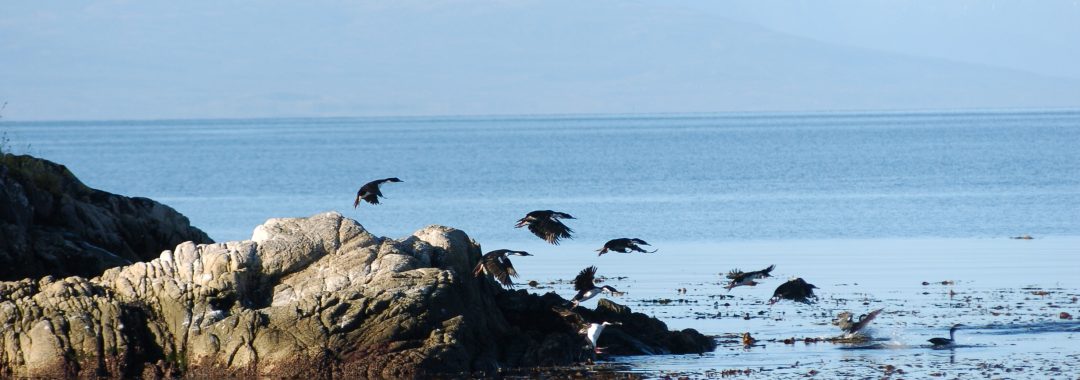Ahead of the UN climate change (COP 26) and biodiversity (COP 15) conferences scheduled later this year, Chile, Costa Rica, France, United Kingdom and the United States today announced a new global partnership to advance the role of MPAs as a nature-based solution in the fight against climate change.
The International Partnership on Marine Protected Areas, Biodiversity and Climate Change, with scientific support from representatives of the IUCN and the Marine Alliance for Science and Technology for Scotland, will work with global leaders to ensure they have the information and tools they need to understand the contribution of MPAs, and the biodiversity they protect, as a solution in helping mitigate and adapt to the effects of climate change on the global ocean.
The government agencies represented in the partnership include: The Joint Nature Conservation Committee (JNCC), supported by Defra, United Kingdom; Ministry of the Environment, Chile; National Oceanic and Atmospheric Administration (NOAA) Office of National Marine Sanctuaries, United States; Ministry of Energy and Environment (MINAE), Costa Rica; and the French Biodiversity Agency (OFB), France.
“All nations rely on healthy marine ecosystems to support life on this planet,” said Professor Dan Laffoley, Marine Vice Chair of the World Commission on Protected Areas at IUCN and an advisor to the partnership. Marine protected areas (MPAs) can be an effective nature-based solution for climate change. Nations must act now to protect key ocean habitats and the services the ocean provides to nature and people.”
As the Earth’s temperature rises, climate change and ocean acidification are severely and rapidly affecting species, ecosystems and people around the globe, jeopardizing food security, shoreline protection, individual livelihoods, and sustainable economic development.
While enhanced greenhouse gas (GHG) reduction targets are vital to protect the ocean and avoid further irreversible impacts, MPAs are increasingly recognized as a key tool for maintaining and restoring ecosystem resilience in a changing climate, providing positive outcomes for biodiversity. Marine protected areas can protect blue carbon habitats, including salt marshes, seagrasses, mangroves, and the seafloor that provide long term storage for atmospheric carbon. They also conserve biodiversity, and provide many ocean and coastal ecosystem services including storm protection and erosion control, food production, employment opportunities, and recreation and tourism. Well-integrated MPA networks can increase species survival by allowing them to move around and escape certain pressures.
Global collaboration is key to realizing the climate benefits MPAs can provide. Members of the partnership are committed to exploring synergies, exchanging knowledge and expertise, and working together to address scientific knowledge gaps, with an initial aim of progressing the evidence by COP26 to advance the role of marine protected areas as a tool for combating climate change. The partnership has launched a website www.mpabioclimate.org with tools and case studies about MPAs and will host webinars in each partner country on the role MPAs play in addressing climate change and conserving biodiversity.
About the Members:
NOAA’s Office of National Marine Sanctuaries, United States, serves as trustee for a system of 14 marine protected areas, encompassing more than 600,000 square miles of America’s ocean and Great Lakes waters. Through active research, management, and public engagement, national marine sanctuaries sustain healthy environments that are the foundation for thriving communities and stable economies.
The Joint Nature Conservation Committee (JNCC) is the public body that advises the UK Government and devolved administrations on UK-wide and international nature conservation. JNCC has responsibility for nature conservation in the UK’s offshore marine environment, the biodiversity of which is vital to many aspects of human well-being, such as supplying food and energy and regulating global climate. JNCC advises on the designation and management of Marine Protected Areas in the UK offshore, which currently totals 76 designated sites.
The Ministry of the Environment, Chile is the public body responsible for collaborating with the President of the Republic of Chile in the design and implementation of environmental policies, plans, and programmes as well as the protection and conservation of biological diversity and renewable natural and water resources in order to promote sustainable development, the integrity of environmental policy and its regulatory framework.
The Ministry of Environment and Energy (MINAE), Costa Rica, is the government department that has the responsibility to ensure the quality of life of people in Costa Rica based on the correct use of the natural resources, conservation of wildlife and sustainable development of the country.
The French Biodiversity Agency (OFB) is France’s central operator for terrestrial, aquatic and marine biodiversity. Ocean protection is one of its priorities. The OFB supports the implementation of public policies in the field of knowledge, conservation, management and restoration of terrestrial, aquatic and marine biodiversity.
Further information is available at www.mpabioclimate.org
#mpabioclimate
